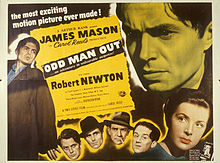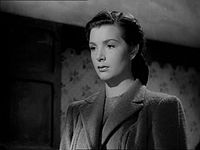- Odd Man Out
-
Odd Man Out 
Odd Man Out movie posterDirected by Carol Reed Produced by Carol Reed Written by F. L. Green
R. C. SherriffStarring James Mason
Robert Newton
Cyril Cusack
Kathleen Ryan
F. J. McCormickMusic by William Alwyn Cinematography Robert Krasker Editing by Fergus McDonell Studio Two Cities Distributed by Rank Organisation Release date(s) February 1, 1947 Running time 116 minutes Country United Kingdom Language English Odd Man Out is a 1947 Anglo-Irish film noir directed by Carol Reed, starring James Mason, and is based on a novel of the same name by F. L. Green.
Contents
Plot
The film's opening intertitle reads:
- "This story is told against a background of political unrest in a city of Northern Ireland. It is not concerned with the struggle between the law and an illegal organisation, but only with the conflict in the hearts of the people when they become unexpectedly involved."
The city and the illegal organisation are never explicitly named in the film, but the protagonist is a chieftain in an IRA-like organization. James Mason plays Johnny McQueen, who is trying to escape from the police after an ill-advised mill robbery meant to replenish the organization's coffers. The film follows McQueen, who has been wounded in the robbery, through an increasingly surreal odyssey over a day and a night. The bleak city (almost certainly Belfast), with its labyrinth of havens and traps, draws Johnny ever deeper into itself as the night wears on.
Production
Aside from Mason, the supporting cast was drawn largely from Dublin's Abbey Theatre. Among the other members of the Organisation are Cyril Cusack, Robert Beatty, and Dan O'Herlihy. On his travels, Johnny meets an opportunistic bird-fancier played by F. J. McCormick, a drunken artist played by Robert Newton, a barman (William Hartnell) and a failed surgeon (Elwyn Brook-Jones). Denis O'Dea is the Inspector on Johnny's trail, and Kathleen Ryan, in her first feature film, plays the woman who loves Johnny. Also of note are W. G. Fay -- a founder of the Abbey Theatre—as the kindly Father Tom, Fay Compton, Joseph Tomelty, and Eddie Byrne. A number of non-speaking parts were filled by actors who later went on to achieve a modicum of fame, including Wilfrid Brambell, Dora Bryan, Geoffrey Keen, Noel Purcell, and Guy Rolfe. Few of the main actors in the film actually manage an authentic Ulster accent.
The cinematographer was Robert Krasker, in his first film for director Reed, lighting sets designed by Ralph Brinton and Roger Furse.
This was the first screen appearance of Steptoe and Son actor Wilfrid Brambell who began his 35 year career as a standing passenger in the tram scene of this film.
The main set was based on the Crown Bar in Belfast; contrary to some sources, it was a studio set built at D&P Studios in Denham, Buckinghamshire, and was not filmed in the real Crown.[1] However, much of the film was shot on location: exterior scenes were shot in West Belfast,[1] although some were shot at Broadway Market, Hackney in London.[2]
Composer William Alwyn was involved writing the leitmotif-based score from the very beginning of the production. It was performed by the London Symphony Orchestra conducted by Muir Mathieson.
Reception
The film's violent ending attracted advance criticism from the censors, and had to be toned down in the finished film.[3] The film received the BAFTA Award for Best British Film in 1948. It was nominated for the Golden Lion award at the Venice Film Festival in 1947, and nominated for a Best Film Editing Oscar in 1948.
Filmmaker Roman Polanski has repeatedly cited Odd Man Out as his favourite film.[4] Polanski feels that Odd Man Out is superior to The Third Man, generally considered to be Reed's masterpiece:
I still consider it as one of the best movies I've ever seen and a film which made me want to pursue this career more than anything else... I always dreamt of doing things of this sort or that style. To a certain extent I must say that I somehow perpetuate the ideas of that movie in what I do.[4]In Popular Culture
In the 2011 computer game L.A. Noire, Odd Man Out can be seen billed on the RKO Theatre located on the corner of 8th and Hill Streets in downtown Los Angeles.
References
Notes
- ^ a b 'BBC seeks stars of Belfast film noir', BBC News 23 February 2007
- ^ 'Filming locations for Odd Man Out The Internet Movie Database
- ^ Rogers, Steve. Soldier in the Snow: A Look at the Making of Odd Man Out, its Key Players and Critical Recognition. (Network, 2006).
- ^ a b Roman Polanski: Interviews. University Press of Mississippi, 2005. ISBN 9781578068005. Pages 159, 189.
Bibliography
- The Great British Films, pp 106–109, Jerry Vermilye, 1978, Citadel Press, ISBN 080650661X
External links
Films directed by Carol Reed 1930s It Happened in Paris (with Robert Wyler) (1935) · Midshipman Easy (1935) · Laburnum Grove (1936) · Talk of the Devil (1936) · Who's Your Lady Friend? (1937) · Bank Holiday (1938) · Penny Paradise (1938) · Climbing High (1938) · A Girl Must Live (1939) · The Stars Look Down (1940)1940s Girl in the News (1940) · Night Train to Munich (1940) · Kipps (1941) · A Letter from Home (1941) · The Young Mr Pitt (1942) · The New Lot (1943) · The Way Ahead (1944) · Odd Man Out (1947) · The Fallen Idol (1948) · The Third Man (1949)1950s Outcast of the Islands (1952) · The Man Between (1953) · A Kid for Two Farthings (1955) · Trapeze (1956) · The Key (1958) · Our Man in Havana (1959)1960s 1970s The Last Warrior (1970) · Follow Me! (1972)BAFTA Award for Best Film (1948–1960) Best Film from Any Source The Best Years of Our Lives (1948) · Hamlet (1949) · Bicycle Thieves (1950) · All About Eve (1951) · La Ronde (1952) · The Sound Barrier (1953) · Forbidden Games (1954) · The Wages of Fear (1955) · Richard III (1956) · Gervaise (1957) · The Bridge on the River Kwai (1958) · Room at the Top (1959) · Ben-Hur (1960)Best British Film Odd Man Out (1948) · The Fallen Idol (1949) · The Third Man (1950) · The Blue Lamp (1951) · The Lavender Hill Mob (1952) · The Sound Barrier (1953) · Genevieve (1954) · Hobson's Choice (1954 film) (1955) · Richard III (1956) · Reach for the Sky (1957) · The Bridge on the River Kwai (1958) · Room at the Top (1959) · Sapphire (1960)Complete list · (1948–1960) · (1961–1980) · (1981–2000) · (2001–2020) Categories:- English-language films
- 1940s drama films
- 1947 films
- Abbey Theatre
- BAFTA winners (films)
- British films
- Chase films
- Film noir
- Films based on novels
- Films directed by Carol Reed
- London Films films
- Two Cities Films films
- Films set in Belfast
- Films set within one day
- Films shot in Northern Ireland
Wikimedia Foundation. 2010.

